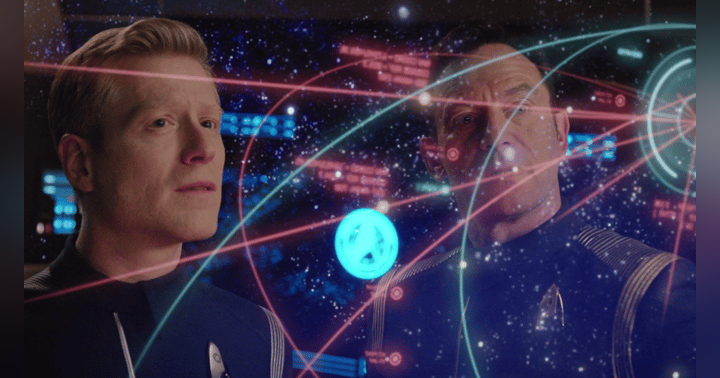Eye of the Beholder

**Trigger warning: suicide**
Before we get started, I want to let you know that this episode and recap of Star Trek deals with suicide. If you have been impacted by suicide, please accept my thoughts and support. If you are considering suicide, please know that I do not want you to hurt yourself. If you’re in the United States, call 1-800-273-8255 or text HOME to 741741.
According to the CDC, in the US in 2019, 12 million adults seriously thought about suicide, 3.5 million planned a suicide attempt, and 1.4 million attempted suicide. Visit cdc.gov/suicide to learn more.
___________________
Today we are reflecting on what leadership lessons can be learned from season 7, episode 18 of The Next Generation, “Eye of the Beholder.” But before we do, we need to have a difficult and important conversation. This episode centers around the topic of suicide. The storyline is a cool idea in theory. A telepathic person becomes a murderer, leaving behind a telepathic residue that triggers the event for others. It could have been fun and interesting. But it just wasn’t. This episode was a product of its time. It came out in February of 1994 with some really great intentions. Suicide was and is one of the leading causes of death and Star Trek made an attempt to meld a sci-fi concept with a message discouraging the act. But it failed.
Allow me to try to do better. I am by no means a mental health or suicide expert. But I have experienced the death of a friend by suicide and I do know a few things. I know that if someone around you is thinking about suicide, and you know it or have reason to believe it, you must bring it up and talk about it. You’re not there to solve their problems or even to stop them. You’re there to say 8 words. Eight very simple words that can tip the scales dramatically: I DO NOT WANT YOU TO HURT YOURSELF. That’s it. I do not want you to hurt yourself. The other thing I know about suicide is that it hurts. It hurts a lot to lose someone you care about to suicide. I’ll never forget the moment I heard that my friend was gone. My heart broke. It still breaks, even right now while I write about it. I can’t imagine what it was like for his family.
If you would like to learn more about suicide from an actual expert, I highly recommend Dr. Paul G. Quinnett’s incredible book, Suicide – The Forever Decision. Quinnett is the Director of the QPR Institute and has a lot of knowledge to share including practical tools for people considering suicide as well as the people around them. One thing I was surprised to learn, is that most people who die by suicide are not mentally ill. Quinnett says the great majority of people who attempt or complete suicide are so sad, hopeless, or angry they simply can’t stand life anymore. I recommend this book so much that I want to make it available to you for free here. I ask only two things in return: that you read it and you share a copy with someone you know.
So while I applaud Star Trek for trying, if you’re reading this before watching the episode, I recommend giving it a skip. There are too many questionable moments. As far as leadership is concerned, you have to watch closely to catch them. But good news! I’ve already done that for you, and there are some great takeaways. Both Riker and Picard have moments in this one for all of us to take to heart. They connect with the people around them, model the importance of trust, and teach us to listen to those we work with. Let’s take a look.
In the opening scene of the episode, Riker approaches Kwan, who is staring off the edge of the catwalk and makes an intentional choice to be personal. “Dan, it’s me, Will Riker.” No rank, no hierarchy. He used first names and referenced a shared experience, “I was down here last week.” This may not seem like a lot at first glance, but remember, the Enterprise has about 1,000 crew members. Dan Kwan is a lieutenant junior grade. There are probably 200 or 300 of him running around the ship. There is only one Executive Officer who not only knew his name but also remembers spending time with him!
This makes me think of one of my high school jobs at a buffet. There were a lot of us that worked there, maybe fifty or so. And I was in the most entry-level position possible – washing dishes. But there was one manager, the assistant store manager, named Matt. I remember him specifically, over thirty years later, because he went out of his way to get to know everyone that worked there. He knew our names, what we liked, what our future plans were, and more. It made me feel like someone there cared about me, Jeff Akin. And what that did was encourage me to work my butt off! Matt was like my Riker! This is why Riker is one of the best examples of a First Officer that we see in all of Star Trek. In fact, in a Twitter tournament I ran back in March of 2021, you voted him the best out of 16 XOs! Because he takes the time to get to know and connect with the people he works with.
What does this look like where you work? For those of you working in the service industry, this is so critical! The high-pressure moments, like the dinner rush that flies in out of nowhere, can make or break a team. If you have built up connections with your team, they are going to show up for you right when you need them! When things go wrong, as they do, they’re going to be more understanding and so are you. If you’re in an office environment, this is where one-on-one conversations become so critical. Taking the time to not only touch base on the work but also build up connections that matter outside of the task at hand. Connecting on a personal level does not mean being Facebook friends or going out together on the weekends. You are still in a professional relationship that requires healthy boundaries. Those boundaries can be hard to define, but I’ve always used what I call “the U-Haul test.” If someone who reports to you calls you on a weekend and asks you to pick up a U-Haul and to help them move, you know you’ve crossed that professional boundary.
Now, let’s talk Picard. The first point is not so much seen in the episode as much as it is implied. When Riker is first reporting on Kwan’s death, Picard says he wants more details so he can provide some context to his family, and that’s all. Troi and Worf head out and start the investigation. They update him as necessary and he provides feedback, but he never directs them on what to do. He doesn’t step in and take charge of anything because he doesn’t have to. He trusts them to do what they need to do.
From my perspective, it is so much easier to manage well than to manage poorly. Micromanaging takes a ton of time and effort! Imagine having a crew of 1,000 people and involving yourself in the details of all the activities. I couldn’t do it! But I’ve worked with people that sure try. What Picard does here is the right way to go. Give direction, trust your team, and let them do it. Don’t be a micromanager. It’s just not worth your time, it’s not worth the stress, and it does not develop your people. You have better things to do and so do the people you work with!
Finally, let’s look at Picard as a listener. In the near-final scene when Troi is debriefing everyone on her experience, Picard is listening intently. There is no action to take, no decision to be made, and there is very little that supports Troi’s version of the story. But none of that matters. What she’s talking about is very important to her. So Picard takes her seriously and listens to her. Intently. Over the last two decades, I’ve found that one of the most valuable things I can do as a leader is to listen.
People just want to be heard. But it is mind-blowing how few leaders take the time to do that. How you do this is often dependent on your position and your role in the organization. When I was Program Director, for example, I would often hold office hours for people to come and talk with me about whatever. I know a CEO who went on a “listening tour,” setting up 15-minute meetings with everyone in her organization looking for feedback on four main areas of growth for the company. Years ago, when I was a supervisor, I worked with a few people that had a lot to say. I wanted, so desperately, to stop working and engage and listen to them. But I couldn’t always do that. So instead I started a new habit. The moment they entered my cubical I would ask, “Do you need to vent or do you want to problem solve?” If they wanted to problem solve, I stopped doing what I was doing and we got into it. If they needed to vent, I’d tell them that I was listening but I was going to keep working. That let me get my work done and it allowed them to say what they needed to say and for me to hear it. I have to point out that this worked because I had established trust with these people. If you just take this approach out of the blue, without relational equity, it will backfire. Find what works for you in the place that you’re at and with the people that you have. The method isn’t as important as creating time and space where people can talk to you and you can hear them.
All in all, there were some redeeming qualities in this episode. Riker shows us the value of forging meaningful relationships with the people you work with. While Picard, once again, teaches us the value of trust and in listening to those on your team. What’s one way you connect with your team? How do you show someone you trust them in the workplace? Do you have a tip on good listening? Share in the Discussion Group so we can learn from each other!
This post contains affiliate links. I may receive a commission for purchases made through these links but it won't cost you any more.


